Ecommerce Expo: Part 4 - Marketing at Seatwave, and semantic ecommerce with Smart Information Systems
Last week I started posting a series of notes and quotes from the London Ecommerce Expo in Earls Court which I attended in October. I've written up Mike Tomlinson talking about multi-variant testing from British Airways, Trenton Moss of Webcredible discussing optimising the purchase process, and Andy Leaver from Bazaarvoice talking about 'social commerce'. Today I wanted to look at two other talks that I attended.
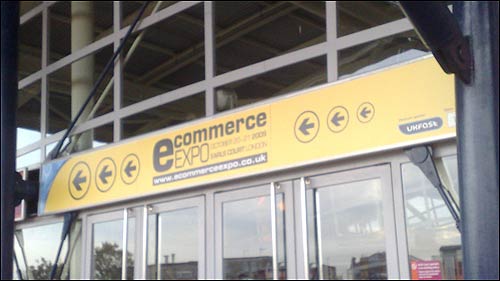
"Building a new business in a brand new category"- James Hamlin, Seatwave
I suspected the word "ethical" was going to be missing from the talk about Seatwave, and I was right. James Hamlin made the point that wherever demand outstrips supply a secondary market forms, but I still struggle to see how they are able to build a business that partners with the very people who are printing 'not for resale' on the back of the tickets Seatwave re-distribute.
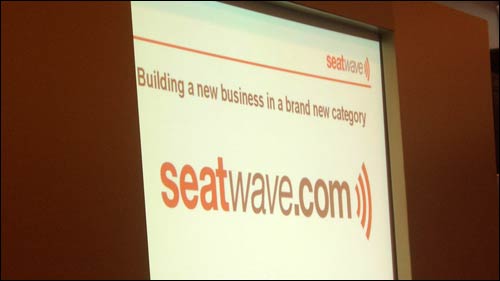
Leaving aside my qualms about the nature of the trade, James gave a very interesting presentation. Two key things stood out for me.
Firstly, he was one of very few people to praise the tech team at his firm. Many case studies at this kind of conference seem to experience IT and technology departments as roadblocks to sales and innovation, but James stressed that Seatwave's tech guys and girls were the enablers of the feeds and APIs that power a lot of their sales.
Secondly, he was a big fan of Google products. In a building full of people trying to sell expensive tools and products to help you make money, Hamlin said that Google Analytics was free and good enough, and that Google Trends and the Google AdWords suite of tools were all they needed from external suppliers to make their campaigns work. All the other tracking they wanted had been wired into their systems as they built them.
Other key takeaways were that James felt it was important if possible to have an in-house online marketing team rather than going down the agency route. As a 'buzz' based product, their in-house team were able to leap onto emerging trends within seconds. Although they "do social media stuff", it is still 'the big three' search, email marketing and affiliate deals that power their business. In the Q&A at the end of the session, someone asked him if he thought their marketing mix would have changed in two years time to include more social aspects, and James unequivocally said no.
Finally, some numbers. Seatwave launched with just 200 tickets available, but now generally has over 1 million tickets in the marketplace. They had 1.5 million unique users in July 2009, and James says, most importantly "the prices are coming down all the time". Whether those prices get anywhere near face value, or whether Seatwave is just a semi-legal mechanism to allow an armchair army of touts to cream profits from legitimate fans, remains a debate for another day.
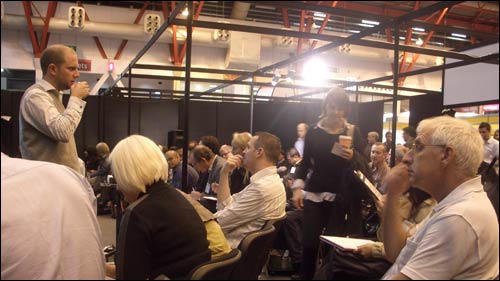
"How semantic web technologies are creating new opportunities for Ecommerce" - Markus Linder, Smart Information Systems GmbH
Markus Linder had a tough time at the Ecommerce Expo, as it wasn't really the right audience to be showing slides that featured RDF data, or mentioning things like OWL or SPARQL. In trying to ground his talk in a real world example he suggested that current search technologies struggle if you put in long terms like "family holiday in Austria 4 star hotel 22-28.8.09 yoga courses and classical concerts" whereas as humans we can see the intent behind the query.
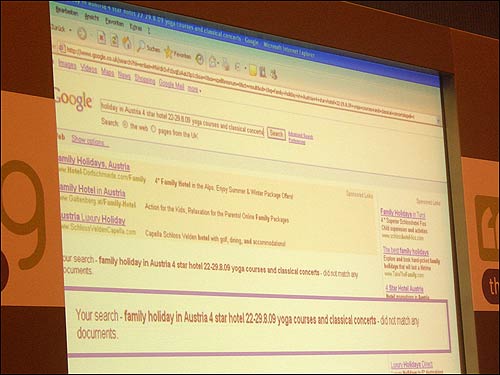
Markus showed us a screenshot of a prototype search engine Smart Information Systems have in progress, but sadly he said he couldn't actually show us the results page - the big tease!
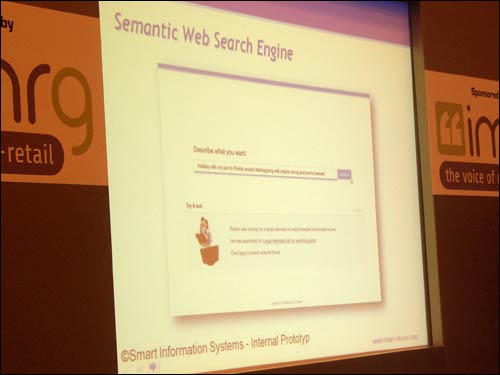
Where I think Markus' talk was useful to the audience was in flagging up that some Ecommerce sites are already embedding rich semantic product data into their online presence. This is a trend that is likely to continue, and which will lead to more sophisticated price comparison sites and customer recommendation engines.
He showed an interesting approach to buying a television. Instead of starting with a range of models and narrowing it down by technical criteria the user may not fully understand, it started with a questionnaire about TV usage. It asked what type of programmes you usually watch e.g films or sport, whether you get your TV via cable or satellite, how far you usually sit away from the screen and whether you use games consoles or not. The system was able to suggest a range of models that matched user requirements they may not have even consciously had, for example to do with the connectors or the refresh rate.
If you wanted to find out more about semantic data in Ecommerce, Markus recommended a presentation on SlideShare by Martin Hepp - "Semantic Web-based E-Commerce: The GoodRelations Ontology"
Next...
In the final part of this series, I'll have a write-up of presentations by Steve Lovatt of Pindar about the 'product information cloud', and a joint talk by SLI Systems and Tiso on site search.
If the technology of Smart Information Systems was better than other search engines for long keywords Markus would shows the results page. If you deny something old and bring something new, then you must show what is your innovation.
After reading this post, I headed over to Smart Information Systems' website and the first thing that caught my site is its Smart Finder product. I must say it is really good as far as the presentation (of the product) goes when I tested it. User-wise it is "friendly" too. I wonder if it's easy to integrate into a website?
I tested that text - "family holiday in Austria 4 star hotel 22-28.8.09 yoga courses and classical concerts" - on Google and it returned 1 result, aside from 2 sponsored links. But that 1 result is pointing to this same page.
Indeed if you were searching for something that long it would be awesome if search engines will be able to understand what you really wanted to find.